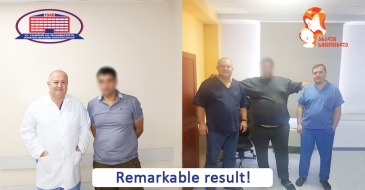
Colon And Rectal Cancer Awareness Raising Month
With the arrival of March, the world medical community is celebrating another event, which is „Blue March" - the month of raising awareness about colorectal (colon and/or rectum) cancer.
Because of this, in different countries around the world, in support of cancer patients, the population wears blue, thus reminding us once again of the importance of screening.
A malignant tumor of the rectum arises from the epithelial cells of the mucous membrane and is characterized by metastasis (spread) to neighboring organs. Its clinical symptoms are determined by the form of tumor growth, the degree of spread, and its relationship to the surrounding tissues. Consequently, early-form tumors are, in most cases, asymptomatic.
Risk factors for colorectal cancer are:
- Family history of colon polyps and/or cancer;
- Inflammatory bowel disease (Crohn's or ulcerative colitis);
- Hereditary disease (Lynch syndrome);
- Type 2 diabetes;
- Excess weight or obesity;
- Smoking;
- Physical inactivity;
- An excessive amount of alcohol and red meat in the diet;
At a later stage, during defecation, there are changes such as:
- Diarrhea;
- Constipation;
- Bleeding from the rectum;
- Bloody feces;
- Suddenly coming pain in the abdomen;
- Flatulence;
- Feeling unable to empty the bowels completely;
- Weakness or fatigue;
- Weight loss for no reason.
The goal of treatment development is to improve the quality management of rectal cancer, to achieve this a diagnostic algorithm must be defined, which will be aimed at preventing both treatment and local, regional, and distant spread of malignant tumors of the rectum.
Keep in mind that, symptoms are not typical for early-stage cancer, and timely diagnosis and treatment are especially effective if detected early, the most important of which is colorectal cancer screening. These are prophylactic examinations in people at risk of developing the disease to timely detect and treat pre-cancerous diseases.
Treatment for rectal cancer may be surgical, radiation, medical, or combined. The method of treatment is selected according to the histological structure of the tumor and the stage of the disease.
Tumor Board of the National Center of Surgery
In general, we would like to inform you that in our clinic, the choice of treatment method for cancer is made by a modern approach by Onco-Concilium, where the following are jointly involved in assessing the patient's condition and determining the method of treatment:
- Clinical Oncologist;
- Chemotherapist;
- Oncologist;
- Radiologist;
- Doctor-Morphologist;
- Radiotherapy Doctor-Specialist.
The direction of treatment decided by such a council is considered to be a modern and result-oriented method.
Department of Radiotherapy
Equipped with the modern and maximally sophisticated 2018 clinically equivalent radiation accelerators of the well-known American company Varian with Truebeam and Vitalbeam, which guarantees a smooth treatment.
The goal of each member of our radiotherapy department team is to offer a treatment course tailored directly to your needs and wants in a caring environment.
Clinic "National Center of Surgery" joins - the month of raising awareness about colorectal cancer, in this regard, within the campaign, women and men aged 50-70 can undergo colorectal cancer screening.
It should be noted, that the research is funded by Tbilisi City Hall!
In addition to screening throughout March, the clinic offers the following promotional discounts to residents:
- Surgical Oncologist promotion;
- Consultation of a Proctologist-Surgeon;
- Gastroenterologist consultation and abdominal ultrasound.
Get screened, stay safe!
Wish you health!
What are patients interested in
Chemotherapy
Qauestion:: Hello, My mother received several courses of chemotherapy, because of metastatic involvement of bone and liver. During that time platelet count significantly decreased and only presented with small skin hemorrhages. In chemotherapy, platelet count sometimes increases or decreases, she simultaneously takes Revolade (50mg) on a daily basis and underwent platelet transfusion several times that had an only short-term effect. Is it possible to find another solution for the mentioned problem at your clinic? Thanks in advance










